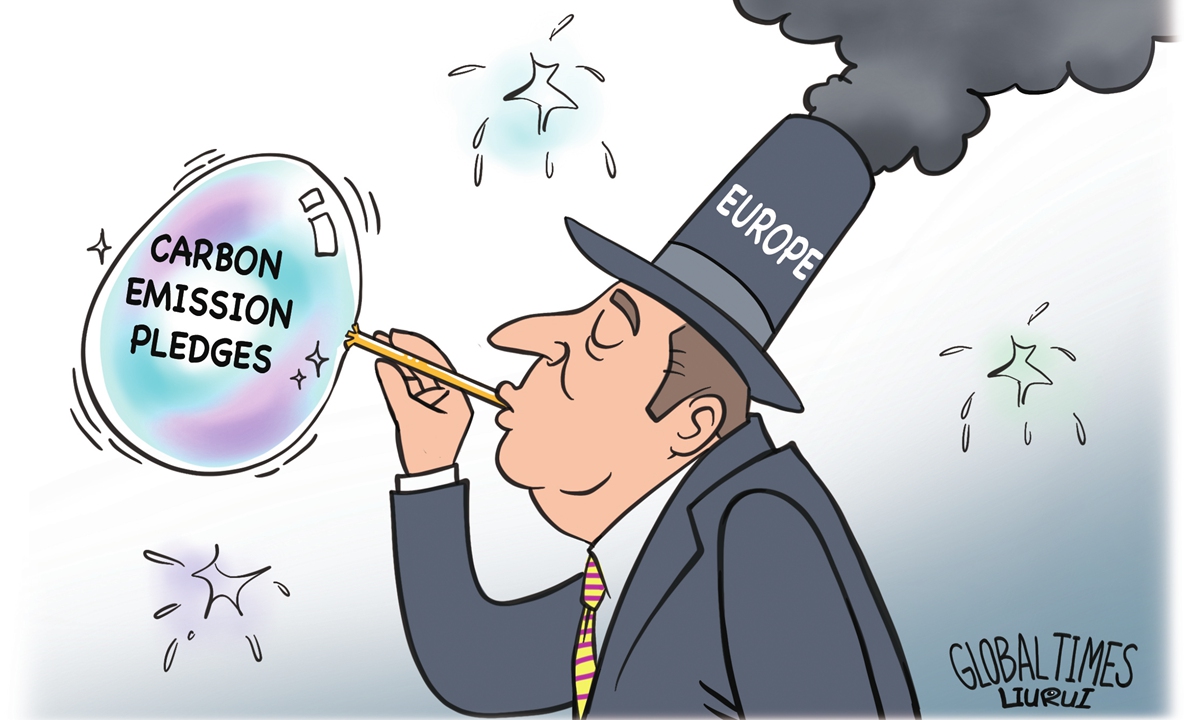
Illustration: Liu Rui/GT
Mouthing high-sounding words while displaying disinterest or incapability in honoring pledges - this is exactly the portrayal of Europe in the face of the global climate issue. Numerous examples can be tossed out, ranging from the West's reluctance to shoulder its historical responsibilities for climate change given their cumulative total of carbon dioxide emissions since the start of the industrial revolution to European leaders skipping climate summit with Africa.According to Politico, African leaders are heading for the Netherlands next month for a climate summit scheduled on September 5, seeking delivery on promised cash to help them cope with climate change, but their European counterparts largely plan to skip the meeting.
The lack of in-person engagement from the highest levels of European governments is in stark contrast to the long-distance attendance of the African leaders, Politico commented. Quoting an observer, the report said, "Spending on climate protection in Africa may also seem like a harder sell for European leaders at a time when their citizens face a generational cost-of-living crisis."
It is undeniable that this is a grim reality faced by Europe. Energy costs are skyrocketing, and fears about access to electricity and heating are growing. While European countries are looking everywhere for alternatives to Russian energy, politicians are encouraging their citizens to take less showers and not wash their clothes. Amid the backdrop of uncontrolled COVID-19 outbreaks, looming economic recession and surging inflation, it is even uncertain how Europe can survive this winter.
Europe's urgent need for energy has shattered its climate commitments. It thus finds itself in an awkward position in keeping a high profile over this topic. If European leaders participate in the summit, what would they say or offer?
Such a scenario won't just show up at the climate summit in September, but will continue to the 27th session of the Conference of the Parties (COP 27) to the UNFCCC (UN Framework Convention on Climate Change) in Egypt in November.
Nevertheless, even before Europe starts to feel powerless to deal with the climate issue, it was far from taking its due responsibilities.
Western countries took the lead in going through industrialization when they emitted carbon dioxide without restraint. After they became developed economies, they moved their manufacturing industries to developing countries - enjoying products made elsewhere, yet demanding the developing world to pay for carbon emissions. In other words, the West-led model of dealing with climate change sacrifices the interests of some other countries to satisfy their own, Shen Yi, a professor at Fudan University, told the Global Times.
This explains why whenever climate change is brought up on the internet, netizens from developing countries complain that low-carbon standards, without differentiated responsibilities, is a trap that developed economies have set for developing countries.
If Europe has "contributed" anything to environmental protection, it is the game rules collectively formulated by Western countries, aiming at changing the scenario of being overtaken by emerging and developing countries in real economy, as well as reestablishing Europe's hegemony, Shen said.
Europe does have its own targets for emissions reductions. But right now, it is heading in the opposite direction, as environmental protection now conflicts with their own interests. Many European countries, including Germany, France, the Netherlands and Denmark, have been quietly restarting coal-fired power. More hypocritically, they now redefine gas and nuclear energy as "green."
Even quite a few Westerners are discouraged against the backdrop. Earlier this month, The Sydney Morning Herald published an article entitled, "What if China saved the world and nobody noticed?" which articulate that "the revolution under way in China is truly staggering. They literally lead the world in every 0-emissions technology."
Observers note that China's industrial manufacturing capacity is equivalent to that of several Western countries combined, but China's consciousness on environmental protection is particularly strong. It has set high goals for itself, very strict carbon emission standards and plan to hit carbon emission peak. Moreover, China has at the same time provided financial, equipment, technological support to other developing countries to cope with climate change.
On the contrary, developed countries have long failed to meet their pledges to deliver financial support to help poorer countries cope with the issue.
Western economies, including Europe and the US, seem to care so much about climate change, but their geopolitical strategy is damaging their seemingly good-looking targets. The climate crisis can by no means be solved by one single country. But West-initiated major power games, bloc confrontations, decoupling rhetoric and Cold War mentalities are jeopardizing cooperation prospects on climate protection.
The real pressing task for Europe is to address its realistic challenges, stabilize its economy and energy supply, and more significantly, reflect on its strategy of following the US too closely, especially when it comes to creating tensions worldwide. As a result, apart from facilitating American arms dealers to make a fortune, the entire globe, including Europe, is pushed into crises and suffering.
It is very telling that West-led rules in global environmental governance no longer work. The time has come for a change, and a quick one indeed.
The author is a reporter with the Global Times. opinion@globaltimes.com.cn

